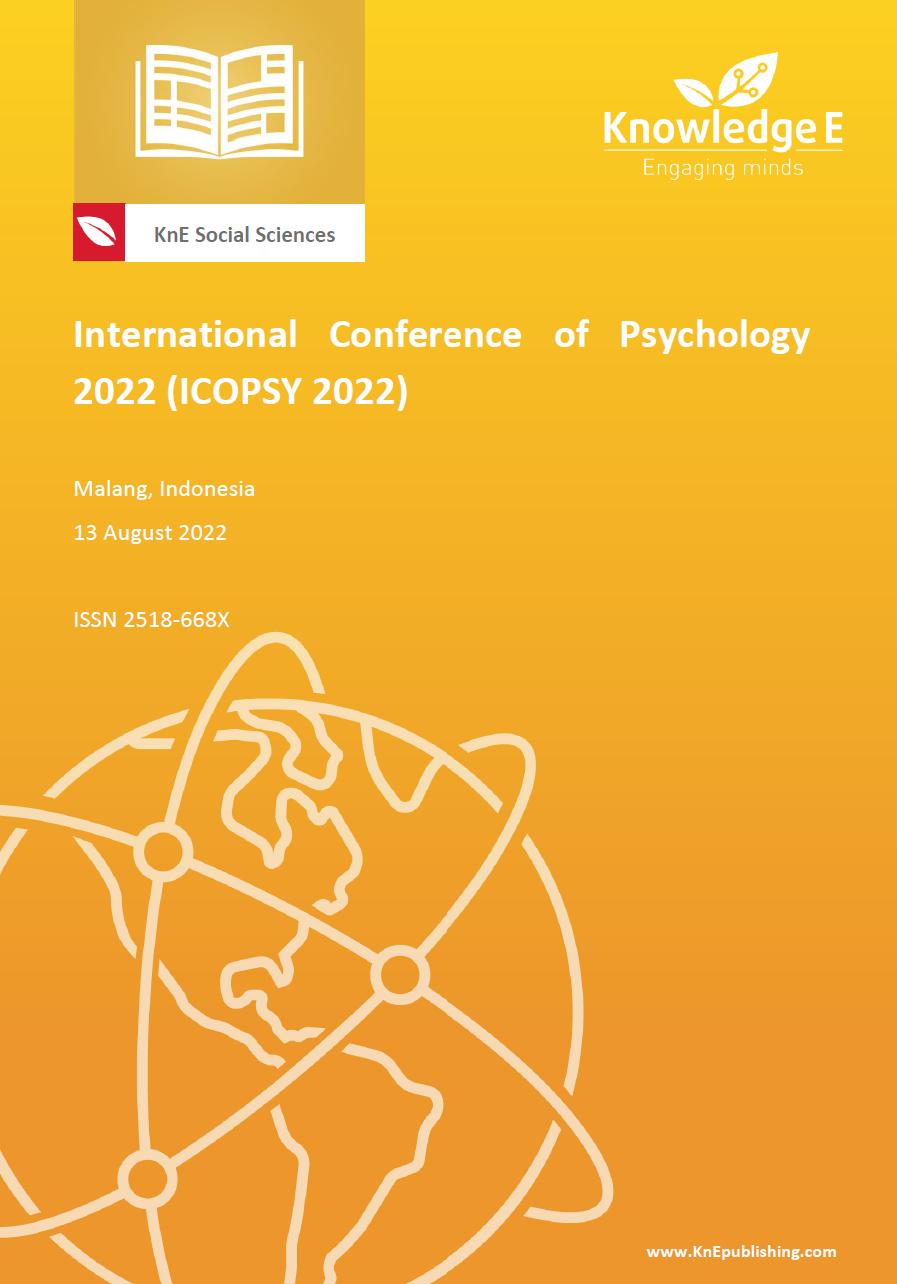The Relationship Between Peer Social Support and Resilience in State University of Malang Students Affected by Distance Learning
DOI:
https://doi.org/10.18502/kss.v7i18.12383Abstract
This study aimed to examine the relationship between peer social support and resilience of the State University of Malang students affected by Distance Learning. This study employed quantitative research techniques with a descriptive correlational design. The study’s population consists of Malang State University students who have experienced or are currently experiencing Distance Learning. The subjects used were calculated using Isaac and Michael’s table with a 5% error rate, obtaining a sample of 345 people. Accidental sampling is a sampling technique used by researchers to collect data using a Likert scale model with the development of the Interpersonal Social Evaluation List (ISEL) Scale and the Connor and Davidson Resilience Scale (CD-RISC). The research analysis used descriptive analysis techniques and Pearson’s Product Moment correlation data analysis. The results revealed that there was a significant positive relationship between the two variables with a value (r) of .705 and sig. (p) of .00 < .05.
Keywords: social support, resilience, distance learning
References
[2] Meade J. Mental Health Effects of the COVID-19 Pandemic on Children and Adolescents: A Review of the Current Research. Pediatric Clinics of North America. 2021;68(5):945-959. https://doi.org/10.1016/j.pcl.2021.05.003
[3] El-Zoghby SM, Soltan EM, Salama HM. Impact of the COVID-19 Pandemic on Mental Health and Social Support among Adult Egyptians. Journal of Community Health. 2020;45(4):689-695. https://doi.org/10.1007/s10900-020-00853-5
[4] Nasrullah N, Sulaiman L. Analisis Pengaruh Covid-19 Terhadap Kesehatan Mental Masyarakat Di Indonesia. Media Kesehatan Masyarakat Indonesia. 2021;20(3):206- 211. https://doi.org/10.14710/mkmi.20.3.206-211
[5] Putri IA, Prasetyo A, Saputra BD. Hubungan Kesiapan Mahasiswa Dengan Kemampuan Pemahaman Materi Pembelajaran Pada Metode Pendidikan Jarak Jauh Mahasiswa Program Sarjana Stikes Al Irsyad Al Islamiyyah Cilacap. Jurnal Kesehatan Al-Irsyad. 2021;14(2). https://doi.org/10.36760/jka.v14i2.305
[6] Clabaugh A, Duque JF, Fields LJ. Academic stress and emotional well-being in United States College students following onset of the COVID-19 pandemic. Frontiers in Psychology. 2021;12:628787. https://doi.org/10.3389/fpsyg.2021.628787
[7] Ramadanti E, Mukhlis I, Utomo SH. Dampak pandemi COVID-19 terhadap pendidikan tinggi di Kota Malang. Jurnal Ekonomi, Bisnis Dan Pendidikan (JEBP). 2021;1(3):209- 218. https://doi.org/10.17977/um066v1i32021p209-218
[8] Dewantara JA, Nurgiansah TH. Efektivitas Pembelajaran Daring di Masa Pandemi COVID 19 Bagi Mahasiswa Universitas PGRI Yogyakarta. Jurnal Basicedu. 2021;5(1):367-375. https://doi.org/10.31004/basicedu.v5i1.669
[9] Fauziyyah R, Awinda RC, Besral B. Dampak Pembelajaran Jarak Jauh terhadap Tingkat Stres dan Kecemasan Mahasiswa selama Pandemi COVID-19. Jurnal Biostatistik, Kependudukan, dan Informatika Kesehatan. 2021;1(2):113-123. https://doi.org/10.51181/bikfokes.v1i2.4656
[10] Connor KM, Davidson JRT. Development of a new resilience scale: The Connor- Davidson Resilience Scale (CD-RISC). Depression and Anxiety. 2003;18(2):76-82. https://doi.org/10.1002/da.10113
[11] Grotberg EH. Resilience for Today: Gaining Strength from Adversity. Rev ed. USA: Praeger ; 2000.
[12] Amir S, Kant V. Sociotechnical Resilience: A Preliminary Concept. Risk Analysis. 2018;38(1):8-16. https://doi.org/10.1111/risa.12816
[13] Reivich K, Shatté A. The Resilience Factor: 7 Essential Skills for Overcoming Life’s Inevitable Obstacles. New York, USA: Broadway Books; 2002.
[14] Everall RD, Altrows KJ, Paulson BL. Creating a Future: A Study of Resilience in Suicidal Female Adolescents. Journal of Counseling & Development. 2006;84(4):461-470. https://doi.org/10.1002/j.1556-6678.2006.tb00430.x
[15] Bernard, B. Resiliency: What We Have Learned. San Francisco, CA: WestEd Regional Educational Laboratory; 2004.
[16] Sarafino EP. Health Psychology: Biopsychological Interactions. 5th ed. USA: John Wiley & Sons; 2011.
[17] Taylor SE. Health Psychology. New York: McGraw Hill, Inc; 2009.
[18] Li F, Luo S, Li Y, Ye L, Zheng X, Xu B, Ding Y, Ling P, Zhou M, Chen X. Effects of Sources of Social Support and Resilience on The Mental Health of Different Age Groups During The COVID-19 Pandemic. BMC Psychiatry. 2021;21(1):16. https://doi.org/10.1186/s12888-020-03012-1
[19] Alvina S, Dewi FIR. Pengaruh Harga Diri dan Dukungan Sosial Terhadap Resiliensi Mahasiswa Dengan Pengalaman Bullying di Perguruan Tinggi. Psibernetika. 2017;9(2):Article 2. https://doi.org/10.30813/psibernetika.v9i2.472
[20] Wentzel KR. Social relationships and motivation in middle school: The role of parents, teachers, and peers. Journal of Educational Psychology. 1998;90:202-209. https://doi.org/10.1037/0022-0663.90.2.202
[21] Sari PKP, Indrawati ES. Hubungan Antara Dukungan Sosial Teman Sebaya Dengan Resiliensi Akademik pada Mahasiswa Tingkat Akhir Jurusan X Fakultas Teknik Universitas Diponegoro. Jurnal EMPATI. 2016;5(2):177-182.
[22] Arnett JJ. Adolescence and Emerging Adulthood: A Cultural Approach. NJ: Pearson; 2013.
[23] Páramo MF, Martínez Z, Tinajero C, Rodríguez MS. The Impact of Perceived Social Support In First- Year Spanish College Students Adjustment. Educational Alternatives. 2014;12(1):289-300.
[24] Coatsworth-Puspoky R, Forchuk C, Ward-Griffin C. Peer support relationships: An unexplored interpersonal process in mental health. Journal of Psychiatric and Mental Health Nursing. 2006;13(5):490-497. https://doi.org/10.1111/j.1365- 2850.2006.00970.x
[25] Cohen S, Hoberman HM. Positive Events and Social Supports as Buffers of Life Change Stress1. Journal of Applied Social Psychology. 1983;13(2):99-125. https://doi.org/10.1111/j.1559-1816.1983.tb02325.x
[26] Resnick, B., Gwyther, L. P., & Roberto, K. A. Resilience in Aging. New York: Springer; 2011. p. 221-224.
[27] Febriana LI. Pengaruh Dukungan Sosial dan Harapan Terhadap Resiliensi pada Mahasiswa Dimasa Pandemi Covid-19. MEDIAPSI. 2022;8(1):34-41. https://doi.org/10.21776/ub.mps.2022.008.01.319
[28] Kumalasari D, Akmal SZ. Resiliensi Akademik dan Kepuasan Belajar Daring di Masa Pandemi COVID-19: Peran Mediasi Kesiapan Belajar Daring. Persona: Jurnal Psikologi Indonesia. 2020;9(2):353-368. https://doi.org/10.30996/persona.v9i2.4139
[29] Cassidy S. The Academic Resilience Scale (ARS-30): A New Multidimensional Construct Measure. Frontiers in Psychology. 2016;7(1781):1-11. https://doi.org/10.3389/fpsyg.2016.01787
[30] Missasi V, Izzati IDC. Faktor-faktor yang Mempengaruhi Resiliensi. Prosiding Seminar Nasional Magister Psikologi Universitas Ahmad Dahlan. 2019:433-441.
[31] Pariartha NKAMYH, Eva N. Pengaruh Dukungan Sosial Terhadap Resiliensi pada Mahasiswa Baru. Seminar Nasional Psikologi UM. 2021;1(1):107-120.

